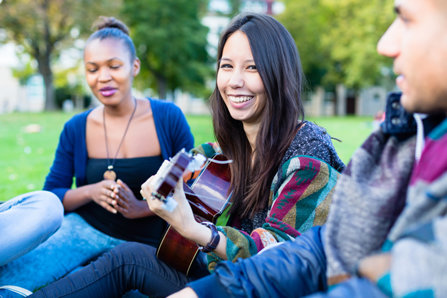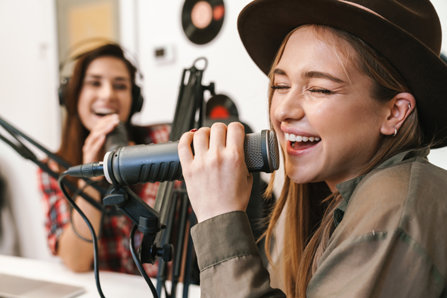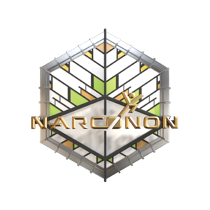The Value of the Arts in Recovery – Part #1

Just about everyone enjoys listening to music. Music makes people feel good. Listening to music is calming, relaxing, soothing, enlightening, uplifting. Listening to music is simply a fun thing to do. There are hundreds of music styles and millions of different songs out there.
Recovering addicts benefit greatly from having hobbies and activities which uplift them. Music can be such a hobby, whether it involves simply listening to music or going so far as learning to play music.
The Benefits of Music
Music has been made for thousands of years. Since man could speak, he has sung. And since man could make tools, he has made musical instruments. We cannot deny that music has played an immense cultural role in the advancement of mankind. Through the centuries music has been there, guiding us forward and helping us, and healing us when necessary.
When people are in recovery, it’s a good idea for them to take on a hobby or two. Learning to play a musical instrument, joining a band, playing music for a church group, community group, assisted living center, or even teaching music to others can all act as rewarding, uplifting activities.

Music connects people, bringing people together to enjoy the art of music. When recovering addicts take on music as a hobby, they also have the opportunity to connect with other, like-minded, creative individuals. This gets recovering addicts grounded in beneficial, healthy, constructive activities. It helps them steer clear from unhealthy, potentially toxic activities and people.
Music, A Creative Outlet for Those in Recovery
Indiana Lee, a contributor for Making Music Mag, writes about the sheer power and the creative aspect of making music. She says, “Music is the sound of our emotions. Certain types of music therapy hone in on writing music, playing instruments, dancing, and singing in a way that helps a patient with self-expression.”
“Music is the sound of our emotions. Certain types of music therapy hone in on writing music, playing instruments, dancing, and singing in a way that helps a patient with self-expression.”
And she’s spot on. Creating music uplifts every corner of the soul, helping those who are in recovery find themselves, express themselves, and enjoy life more. You simply cannot put a price on that.
The Power of the Arts – Music and Art Resources
We see addiction portrayed in our culture constantly. That can be a good thing, particularly if the harms and dangers of addiction are correctly and appropriately presented. Drinking and drug use should not be glorified across any medium.
The adverse effects of drinking and drug use are depicted in movies, television, books, pop culture, art, music, etc. But we rarely see addiction recovery represented on such mediums. It’s all fine and good to showcase the harms of substance abuse, but it would be even better to present recovery and make that side better known, too.

Thankfully, there are some groups and collectives that use music and the arts to show recovery and to show the joy and wonder that can come from breaking free from addiction and from getting sober. There are also music and art groups that exist to give recovering addicts a community, a group where they can continue to heal and recover from addiction by practicing their art with like-minded individuals.
An organization called Manhattan Arts International put together a considerable directory of groups, all of which seek to create music or art in an effort to heal, grow, develop, or expand and flourish in some way.
The organization Addiction and Art seeks to gather artists in recovery and to use art to promote and encourage sobriety and recovery for those who are still struggling with addiction.
In Museum Next, contributor Charlotte Coates writes about how museums can use recovery-based exhibits and presentations to support artists in recovery, to raise awareness for addiction and the need for treatment, and to reduce the stigma surrounding addiction.
Drugs are the Antithesis of Music and Art
Drugs are destructive. Art and music are creative. One Narconon contributor wrote, “In stark contrast to art, its purpose and the effects it creates on the people who experience it, and its important influence upon the future of a society—are drugs. Drugs and addiction are the antithesis to the creation of a better future, the antithesis to the purpose and role of the artist, and very likely the single most destructive element to both the artist and his or her creativity. Drugs and addiction are the source of paintings never painted, stories never written, music never played, songs never sung, leaving an empty place in all our lives.”
And that couldn’t be more true. Music and art provide inroads to uplifting one's inherent creativity. Drug and alcohol use does nothing but beat a person down, hamper his life, destroy his creativity, and hinder his forward momentum not only in the arts but in literally everything else he sets his mind to.
People have found their artistic selves reinvigorated as a result of finding addiction recovery. And others have found a new passion and a new hobby in music and the arts as a result of shedding their addictive habits. If you or someone you care about is struggling with addiction, make sure they get help via a residential drug and alcohol addiction treatment center first.
But once your loved one has gone through rehab and comes out clean and sober, consider helping them get involved in music (especially if it was something they were interested in beforehand or something they always wanted to try). Music can be a healing activity in and of itself. Let it help change and heal life and make life in recovery all the more enjoyable and worthwhile.
Sources:
- http://www.chicagosymphonymusicians.com/news/how-music-can-help-you-heal
- https://www.health.harvard.edu/mind-and-mood/how-music-can-help-you-heal
- https://makingmusicmag.com/music-helps-addiction-recovery/
- https://www.narcononarrowhead.org/blog/importance-of-artistic-inspiration-during-treatment.html
- https://www.healing-power-of-art.org/art-and-healing-organizations/
- http://addictionandart.org/shows.html
- https://www.museumnext.com/article/museums-and-addiction/
Reviewed and Edited by Claire Pinelli, ICAADC, CCS, LADC, RAS, MCAP


